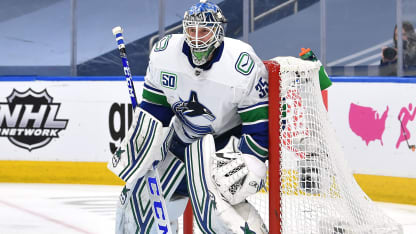Hughes scored 25 power-play points (three goals, 22 assists) in 68 games as a rookie last season, tied for third among NHL defensemen with Neal Pionk of the Winnipeg Jets, behind Torey Krug, who scored 28 for the Boston Bruins before signing with the St. Louis Blues on Oct. 9, and John Carlson, who scored 26 for the Washington Capitals. Hughes' nine power-play points (one goal, eight assists) in the postseason were second among defensemen to the 10 scored by Victor Hedman of the Tampa Bay Lightning, impressive considering Hughes played eight fewer games. Hughes averaged 5.80 power-play points per 60 minutes, seventh among NHL defensemen who averaged at least 2:00 per game on the man-advantage, and helped Vancouver finish fourth in the NHL on the power play in the regular season (24.2 percent).

